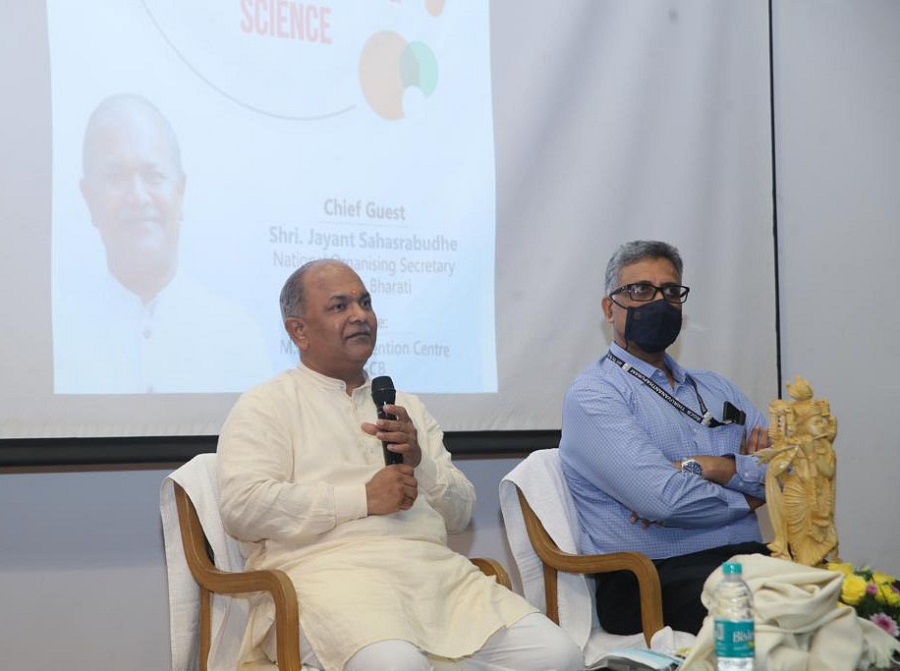

THIRUVANANTHAPURAM:
The country must thoroughly acknowledge the role of scientists who worked against the odds imposed during the two centuries of English rule that focused on de-nationalising India more than colonizing it, Vijnana Bharati National Organizing Secretary Jayant Sahasrabudhe said today.
History has largely neglected the contributions of scientists towards the freedom struggle since the 1757 Battle of Plassey that gave the British East India Company a decisive victory in the subcontinent till 1947 when the country earned Independence, he said, while delivering the ‘Sir C V Raman lecture’ at the Rajiv Gandhi Centre for Biotechnology (RGCB) in the city.
“As much as seekers of knowledge and truth, those scientists strived to regain the identity of India from the hands of the invaders,” Shri Sahasrabudhe noted in his speech on ‘Freedom Struggle and Science’ organized on the occasion of the 133rd birthday of legendary physicist Dr C.V. Raman. “We stand on their shoulders in our continuing efforts towards progress.”
At the function coinciding with the 75th year of the country’s Independence, Shri Sahasrabudhe quoted how a patriotic fervor exhibited by several scientists in imperial India added to the spirit of the nationalist movement. For instance, the British regime refused botanist Jagadish Chandra Bose a teaching job in Presidency College of Calcutta in 1884 after graduating from the University of Cambridge in UK, prompting the Bengali youngster to go on a sustained protest spanning three years. Succumbing to pressure, the administration eventually absorbed Bose as a faculty in 1887, abolishing a two-tier pay-scale for higher-education teachers based on their nativity.
“I would say this was the first case of a Satyagraha, three decades before Mahatma Gandhi resorted to it in Champaran to rescue the indigo farmers from British exploitation,” Sahasrabudhe said in his 70-minute speech.
The British implemented scientific studies in India primarily as a tool to consolidate their rule. “They even employed black magic ‘based on modern science’ to impress the minds of the native people,” the speaker said. “The rulers belittled our culture, reiterated that Sanskrit was a dead language that promoted superstitions through its literature centred around mythology which only checked the progress of humanity.”
In this context, Shri Sahasrabudhe recalled Prime Minister Shri Narendra Modi’s recent statement that Atmanirbhar (self-reliance) required self-confidence. The British invariably sought to destroy the morale of Indians. Quoting an example, Shri Sahasrabudhe recalled how medical doctor Mahendralal Sarkar (1833-1904) was “kicked out” of the Indian Medical Association for citing the science behind Allopathy, which he had himself initially ridiculed. This humiliation led Dr Sarkar to form in 1876 an all-native Indian Association for the Cultivation of Science, which went on to facilitated the research by C.V. Raman (1888-1970) and his winning the Nobel Prize in 1930.
As for chemist-educationist-industrialist P.C. Ray (1861-1944), the British Police records cite him as a “revolutionary in the garb of a scientist”, Dr Sahasrabudhe pointed out. Nobel-winning astrophysicist S. Chandrasekhar (1910-95) has noted that much of India’s scientific discoveries during the British rule were also triggered by the eagerness to announce to the world that the country was on par with or even above the western nations. The speaker quoted the contributions by Ashutosh Mukherjee, P.N. Bose and S.N. Bose, among others, to drive home the point.
All the same, western thinkers such as Werner von Braun (1912-77) and nonagenarian Noam Chomsky have reiterated the richness of India’s contribution to global heritage, including language and science, added Shri Sahasrabudhe, who was also chief guest at the function.
Earlier Dr S.Asha Nair welcome the gathering, and RGCB Director Professor Chandrabhas Narayana, presided over the function and said Sir C.V. Raman’s legacy thrives through his students. “We need to get more light on the role of scientists in the country’s freedom struggle,” he emphasized, hailing the role of Shri Sahasrabudhe, who is also a social worker.
R. Kumar proposed thanks.
more recommended stories
WAYANAD:In an unfortunate incident, tourists in.
KOCHI:The Kerala High Court has suspended.
THIRUVANANTHAPURAM:Kerala Tourism has launched a multi-language.
KOCHI:The American Society of Public Administration,.
IDUKKI:Kerala today made a trail-blazing call.
IDUKKI:Inspirational life stories of women who.
IDUKKI:The international conference on Gender Inclusive.
ALAPPUZHA:The Kerala Police on Friday arrested.
THIRUVANANTHAPURAM:Kerala is all set to play.
THIRUVANANTHAPURAM:Tourism Minister P.A. Mohamed Riyas today.